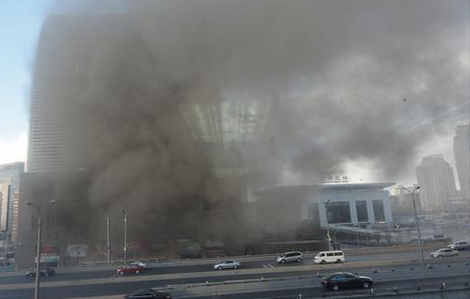|
|||||||||||
BEIJING - When Fang Yingying went to the supermarket in Renmin University of China, she was surprised to see all of the cigarettes replaced with cookies and chocolates.
Not because Christmas is coming, but because of a week of inspections to gauge compliance with a campus smoking ban.
In July 2010, the Ministry of Education and Ministry of Health jointly prohibited smoking in teaching and office areas, libraries and laboratories at institutes of higher education, as well anywhere in primary, middle and high schools.
The Beijing municipal health bureau, Beijing municipal education commission and the Beijing committee for patriotic public health campaign began the weeklong inspections on Tuesday.
"The supermarket staff said cigarettes wouldn't be sold on campus anymore, but I heard them talking this morning about putting the cigarettes aside for a few days and then restocking the shelf with them later," said Fang, a 23-year-old economics graduate student at the university. "They still have boxes of cigarettes in the store to sell."
Li Mingkui, director of the university's department of assets logistic management, did not answer phone calls from China Daily on Wednesday afternoon, and other officials in the department declined to comment.
Many university students in the capital say the smoking ban has been poorly implemented.
Wang Shiyi, 21, a Slovak-language major who just graduated from Beijing Foreign Studies University (BFSU), said that despite the ban on smoking in public places on campus - including dormitories - the male students still feel free to light up when chatting or feeling bored.
"Smoking in dorms is especially common among the juniors and seniors," Wang said. "You find cigarette butts in almost all of the seniors' dorms."
"It's easy to pick up a pack of cigarettes on campus, and sometimes students even give dorm managers cigarettes in return for favors," said Bai Ye, a graduate of the National Research Center for Foreign Language Education at BFSU.
According to Bai, tobacco is still common in dorms partly because of insufficient supervision, but also because there are no penalties for offenders.
"The most serious punishment you'd get is simply a warning if there are too many cigarettes lit that it could be a fire hazard," Wang said.
Rao Yingsheng, deputy director of the Beijing committee for patriotic public health campaign, said he saw better observance of the smoking ban on Tuesday, the first day of a week of inspections, than during inspections in September, when more than 20 percent of the institutes failed.
"Some institutes don't view tobacco control on campus as part of the daily work, and they focus on supervision only when inspections are coming," Rao said. "Very few faculty members would dissuade a student from smoking or provide any guidance."
Rao also said that private institutes are more often clouded by smoke than the public ones.
The Chinese Association on Tobacco Control released a report in September, covering 800 institutes from 31 provinces, that ranked Beijing as 23rd in terms of compliance with the campus smoking ban.
"To eliminate tobacco on campus might be the hardest nut to crack for the smoking ban," said Suo Chao, the association's spokesman. "However, we should stick to it, because most smokers start in college."
Related Stories
Enforce ban on smoking 2011-12-09 08:41
Critique smolders for honor to tobacco scientist 2011-12-13 07:08
Hot Topics
HIV/AIDS, Egypt protest, Thanksgiving, climate change, global economic recovery, home prices, high-speed railways, school bus safety, Libya situation, Weekly photos
Editor's Picks

|

|

|

|

|

|







